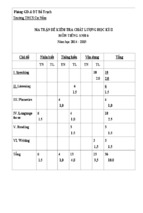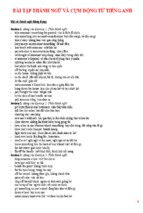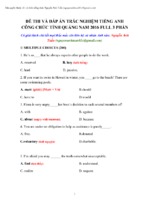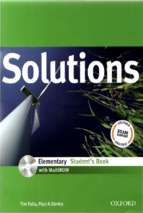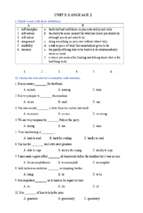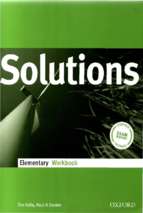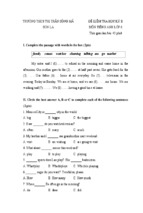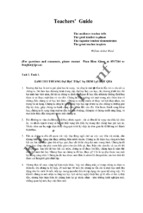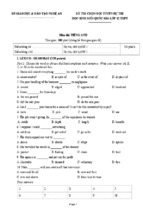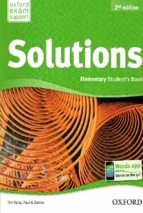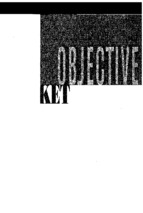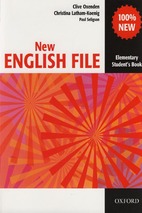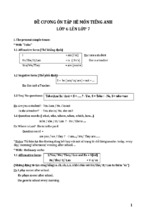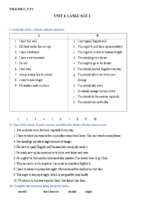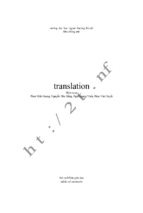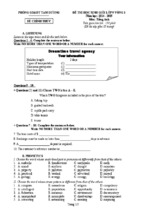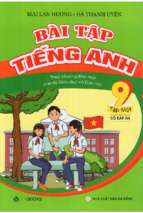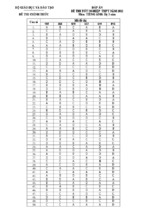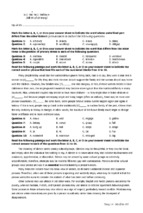Bài tập tiếng anh 7 (bùi văn vinh)
Bài tập tiếng anh 7 (bùi văn vinh)
BÙI VĂN VINH (Chủ biên)
DƯƠNG THỊ HỒNG ĐIỆP
BÀI TẬP
TIẾNG ANH
LỚP 7
CÓ ĐÁP ÁN
(Theo chương trình Tiếng Anh mới nhất của Bộ giáo dục và Đào tạo)
NHÀ XUẤT BẢN ĐẠI HỌC QUỐC GIA HÀ NỘI
Lời nói đầu
Sách Bài tập Tiếng Anh lớp 7 dựa vào phương pháp dạy ngôn ngữ giao
tiếp (Communicative Language Teaching Method). Sách tập trung vào việc phát
triển các kỹ năng ngôn ngữ cho học sinh Trung học cơ sở thông qua các dạng
bài bổ ích, trong đó tập trung vào luyện ngữ âm, từ vựng, kỹ năng đọc hiểu, viết
và sử dụng ngôn ngữ tổng hợp thông qua các bài kiểm tra (Tests), giúp cho
người học có khả năng tổng hợp kiến thức hiệu quả nhất.
Mỗi bài học trong cuốn sách Bài tập Tiếng Anh lớp 7 được biên soạn
theo chủ điểm quen thuộc với học sinh Trung học cơ sở.
Mỗi đơn vị bài học được chia thành 3 mục lớn như sau:
PART 1: GRAMMAR REVIEW
PART 2: EXERCISES
A. PHONETICS
B. VOCABULARY AND GRAMMAR
C. READING
D. WRITING
PART 3: TEST YOURSELF
Sách Bài tập Tiếng Anh lớp 7 được biên soạn dựa trên thực tiễn của việc
dạy và học tiếng Anh. Đây là nguồn tài liệu tham khảo bổ ích cho giáo viên và
học sinh và rất thiết thực trong giao lưu quốc tế nhằm nâng cao khả năng sử
dụng ngôn ngữ tiếng Anh trong thời kỳ hội nhập. Tác giả mong nhận được
những ý kiến đóng góp của các nhà giáo, đồng nghiệp, phụ huynh học sinh và
độc giả quan tâm để cuốn sách ngày một hoàn thiện hơn.
Trân trọng!
Unit
MY HOBBIES
1
PART 1: GRAMMAR REVIEW
1. The present simple (Thì hiện tại đơn): (Diễn tả hành động sự việc xảy ra theo thói
quen, thường xuyên xảy ra hoặc lặp đi lặp lại ở hiện tại).
The present simple is often used with the following words and phrases:
- Adverbs: always, usually, often, sometimes, rarely, never
- Phrases: every Monday/ week/ etc.
each Monday/ week/ etc.
once/ twice a week/ month/ etc.
three times a week/ month/ etc.
Note: Remember that these adverbs usually go before the verb, but after the verb “To
be”.
Ex: I often play football with my friends.
I am often late for my piano lessons.
2. The future simple (Thì tương lai đơn): (Diễn tả hành động sự việc sẽ xảy ra trong
tương lai; sự tiên đoán; lời đề nghị hay yêu cầu hoặc những quyết định ở thời điểm
hiện tại).
- Express facts about the future:
The new airport will be the biggest in Europe.
- Express predictions:
You’ll have a great time in Ha Long Bay.
- Express offers or requests:
We’ll help you get ready for your holiday.
- Express decisions made now:
I know! I’ll go to China this summer.
3. Love/ like/ hate and enjoy:
We can use the verbs “like”, “love”, “hate” and “enjoy” to explain our likes and
dislikes:
Ex: - I love chocolate.
- He likes classical music.
If we use a verb, it must be in the “-ing” form:
Ex: - I love listening to music.
- I like walking in the park.
PART 2: EXERCISES
A. PHONETICS
I. Find the word which has different sound in the underlined part.
1. A. bird
B. girl
C. first
D. sister
2. A. burn
B. sun
C. hurt
D. turn
3. A. nurse
B. picture
C. surf
D. return
4. A. neighbor
B. favorite
C. culture
D. tourist
5. A. hobby
B. hour
C. hotel
D. hot
II. Put the word into the correct column according the underlined part.
camera
bird
learn
first
final
culture
natural
heard
sir
girl
signal
birthday
again
word
world
yesterday
neighbor
turn
third
assistant
/ə/
/ɜː/
B. VOCABULARY AND GRAMMAR
I. Find which word does not belong to each group.
1. A. reporter
B. collector
C. gardener
D. newspaper
2. A. stamp
B. album
C. collector
D. mountain
3. A. skating
B. climbing
C. gardening
D. horse-riding
4. A. hate
B. enjoy
C. love
D. like
5. A. unusual
B. favourite
C. popular
D. common
II. Read the dialogue and fill the correct words in the blanks, use the words in the box.
are
from
enjoy
climb
show
collecting
expensive
about
Nick:
Hi Mi, welcome to our house!
Elena:
Come upstairs! I’ll (1)
Mi:
Wow! You have so many dolls.
Elena:
Yes. My hobby is (2)
Mi:
I like collecting glass bottles.
Elena:
Really? That’s very unusual. Is it (3)
you my room.
dolls. Do you have a hobby?
?
Mi:
Not at all, I just keep the bottles after we use them. What (4)
doll collecting? Is it expensive?
Elena:
I guess so, but all of my dolls (5)
uncle always give me dolls on special occasions.
Mi:
Your dolls are all very different.
Elena:
Yes, they’re (6)
Nick:
I don’t know why girls collect things. It’s a piece of cake.
Mi:
Do you have a difficult hobby, Nick?
Nick:
Yes, I (7)
Mi:
But Nick, there are no mountains around here!
Nick:
I know. I’m in a mountain climbing club. We travel to mountains around Viet
Nam. In the future, I’ll (8)
mountains in other countries too.
presents. My aunt and
all over the world!
mountain climbing.
III.Complete the sentences with the correct prepositions.
1. Mr. Porter is nice
everyone.
2. Kathy was absent
class yesterday.
3. Are you ready
the test?
4. I’m angry
Greg.
5. I’m mad
Peter.
6. Are you afraid
dogs?
7. Sometimes people aren’t kind
8. One inch is equal
9. I’m thirsty
animals.
2.54 centimeters.
a big glass of ice water.
10. Joe has good manners. He’s always polite
11. I'm not familiar
everyone.
that book. Whose is it?
12. John’s thermos bottle is full
coffee.
IV. Choose the correct answer in each sentence.
1. Are you interested for/ in photography.
2. This is my best/ favourite book. It’s David Copperfield, by Dickens.
3. I’ve decided to make/ join the local swimming club.
4. Kate usually passes/ spends most of her time reading.
5. Tim has a very interesting fun/ hobby. He builds small boats.
6. What do you like doing in your empty/ spare time?
7. Wendy is a member/ team of the drama club.
8. Anna likes going to the cinema/ cinema.
V. Complete the sentences with the correct form of the verbs in brackets.
1. Sally and her family love (go)
to the park in the summer.
2. Her mum likes (lie)
favourite magazines.
on the blanket and loves (read)
3. Anna’s family (like)
the park because they love (be)
4. I enjoy (collect)
dolls and it becomes my pleasure.
her
outdoors.
5. We love (watch)
new films, and we (go)
watch a new Hollywood film next weekend.
6. My brother hates (do)
to
the same things day after day.
7. Our uncle (play)
badminton once a week.
8. I (collect)
a lot of stamps from foreign countries so far.
9. In 2100, people (travel)
in flying cars.
10. I’m so hungry, Mum.
- I (make)
you some sandwiches.
C. READING
I. Read the text and choose the correct answer.
If you enjoy cycling for pleasure, doing it in London can be a shock. There are not
enough lanes especially for bikes, and making your way through the traffic can be very risky.
But if you have great passion, cycling in London can be exciting, and it is an inexpensive
way of keeping fit if you live there. Some cyclists don’t mind spending a lot of money on
expensive bikes. However, if you just want a basic bike that is only for occasional use, there
are many cheap choices. Several markets have cheap bikes on sale which may not be
impressive to look at but should be satisfactory. You should buy a cycling helmet if you want
to cycle in London. Wearing a cycling helmet is not compulsory in Britain, but it is a good
idea to wear one for protection.
1. What is the main idea of the passage?
A. Cycling helmets
B. Cheap bicycles
C. Bicycle markets
D. Cycling in London
2. According to the passage, cycling in London is
A. easy
B. difficult
C. tiring
D. boring
C. excitement
D. doing exercise
3. The word “it” in line 3 refers to
A. cycling
B. passion
4. The difficulty of cycling in London is described in lines
A. 2
B. 5
C. 5-6
D. 8-9
5. According to the passage, all the followings are true EXCEPT that
A. It is compulsory to wear a helmet when cycling in Britain.
B. Some bikes in London are cheap.
C. There are not many lanes especially for bikes.
D. Some cyclists don’t want to buy expensive bikes.
II. Complete the text with the correct form of the verbs in the list.
like (2)
live
be
travel
sing
read
go
write
make
This is my favourite singer. He (1)
a famous rock star. He (2)
America. He (3)
all around the world and in rock concerts. He (5)
songs and (6)
his own video dips. In his free time, he (7)
home listening to his CDs. At weekends, he usually (8)
to
in
his
staying at
expensive
restaurants with his friends. He also (9)
things. I can’t wait to see him perform live. I (10)
a lot of books about strange
him so much.
III.Choose the most suitable word for each space.
What do you like doing best (1)
your spare time? My cousin Paul likes going (2)
in the country and (3)
photos. Sometimes he (4)
with his friends,
and they (5)
at the park or at the beach. They always (6)
a good time. His
brother Chris isn’t (7)
on walking. He spends most of the (8)
at home.
1. A. for
B. when
C. in
D. at
2. A. for walks
B. walks
C. a walk
D. to walk
3. A. making
B. having
C. taking
D. doing
4. A. travels
B. gets up
C. sees
D. goes out
5. A. enjoy
B. have fun
C. hobby
D. go
6. A. have
B. make
C. do
D. like
7. A. interested
B. out
C. decided
D. keen
8. A. other
B. time
C. people
D. money
D. WRITING
I. Use the words and phrases to write a passage.
1. Stamp collection/ be/ interesting hobby.
2. You/ can learn many things, such/ the geography/ a country/ stamps.
3. Postal stamps/ be a source/ interesting facts/ important dates/ every country/ the world.
4. It/ make stamp collecting/ become very popular.
5. As you look at the pages/ a stamp album, you/ can learn interesting details/ foreign
customs/ arts/ literature/ history/ culture.
6. Their colors/ can make/ you feel relaxed/ happy.
7. Collecting stamps/ can become/ a business.
8. If you are lucky/ finding/ special stamp, it/ will bring/ you some money besides
knowledge/ pleasure.
...........................................................................................................................................
...........................................................................................................................................
...........................................................................................................................................
...........................................................................................................................................
...........................................................................................................................................
...........................................................................................................................................
...........................................................................................................................................
...........................................................................................................................................
...........................................................................................................................................
...........................................................................................................................................
...........................................................................................................................................
II. Rewrite the sentences, using the given words.
1. What is the price of this watch?
How much.........................................................................?
2. What is the price of these beautiful scarves?
How much.........................................................................?
3. Can you tell me the way to Dong Nai Post office?
Can you tell me.................................................................?
4. Can you tell me the way to the station?
Can you tell me.................................................................?
5. They are fast typists.
They..................................................................................
6. Peter is a hard worker.
Peter..................................................................................
7. There are no bottles on the shelf.
There aren’t.......................................................................
8. We have no time to prepare the speech.
We don’t have...................................................................
III.Choose the sentence that has the same meaning as the first.
1. If you are not careful, you will cut yourself with that knife.
A. Unless you are careful, you will cut yourself with that knife.
B. If you are careful, you will cut yourself with that knife.
C. Unless you are not careful, you will cut yourself with that knife.
D. Unless you were careful, you will cut yourself with that knife.
2. Because he doesn’t leave immediately, I call a policeman.
A. Unless he leaves immediately, I won’t call a policeman.
B. If he leaves immediately, I won’t call a policeman.
C. Unless he leaves immediately, I will call a policeman.
D. If he left immediately, I wouldn’t call a policeman.
3. Today isn’t Sunday, so the pupils can’t go swimming.
A. If today is Sunday, the pupils could go swimming.
B. If today were Sunday, the pupils could go swimming.
C. The pupils could go swimming unless today is Sunday.
D. The pupils could not go swimming if today isn’t Sunday.
4. Stop talking or you won’t understand the lesson.
A. If you don’t stop talking, you won’t understand the lesson.
B. If you don’t stop talking, you wouldn’t understand the lesson.
C. If you hadn’t stopped talking, you wouldn’t understand the lesson.
D. If you hadn’t stopped talking, you wouldn’t have understood the lesson.
5. If the homework is difficult, I will ask you for help.
A. Unless the homework is easy, I won’t ask you for help.
B. Unless the homework is difficult, I will ask you for help.
C. Unless the homework is easy, I will ask you for help.
D. Unless the homework isn’t difficult, I won’t ask you for help.
6. I’ll let you borrow the book but you must promise to return it next week.
A. If you promise to return the book, I let you borrow it.
B. If you promised to return the book, I’ll let you borrow it.
C. If you promise to return the book next week, I’ll let you borrow it.
D. If you promise to return the book next week, I won’t let you borrow it.
PART 3: test yourself
I. Find the word which has a different sound in the underlined part.
1. A. prefer
B. better
C. teacher
D. worker
2. A. bear
B. hear
C. dear
D. near
3. A. collect
B. concern
C. concert
D. combine
4. A. absent
B. government
C. dependent
D. enjoy
5. A. future
B. return
C. picture
D. culture
II. Complete by changing the form of the word in capitals.
1. Running after that thief was very
2. You looked so
of you!
COURAGE
when you fell asleep on the sofa.
3. All four of my grandparents are still
.
PEACE
LIVE
4. Did you vote in the last
?
ELECT
5. It can be very difficult for
when they leave prison
and go back into the community.
PRISON
6. At the end of the film, you hear a single
and then
A1 Pacino falls to the ground.
SHOOT
7. It’s
BELIEVE
! I’ve lost my glasses again!
8. I think were all in
that something must be done
about the problem.
AGREE
9. Should I write “British” or “English” as my
10. We’ll only have real
?
NATION
when women earn as much
money as men.
EQUAL
III.Choose the correct answers A, B, C or D.
1. Nowadays people
A. spend
hours sitting in front of computers.
B. last
C. set
2. I think you should take up swimming
A. so
3. My family enjoys
money.
A. garden - to
B. because
D. take
it is suitable for your health condition.
C. although
D. but
because we can sell vegetables and flowers
B. gardening - for
C. gardening - with
4. If your hobby is greeting card making, you can give your
presents.
D. garden - of
to your friends as
A. hobby
B. money
C. greetings
D. products
5. My sister’s hobby is sewing, and she can get the sewing patterns from the
magazines.
A. fashion
B. cooking
C. sports
D. science
6. My brother doesn’t like ice-skating because he thinks it is
A. danger
B. in danger
.
C. dangerous
D. endangered
7. My sister is very keen on swimming, and she goes swimming three
A. time
B. a time
C. times
a week.
D. timings
8. We often read the instructions carefully in order to make
like best.
A. meanings
B. models
of the things we
C. copies
D. uses
9. You need to be
to follow eggshell carving because it may take two
weeks to complete one shell.
A. careful
B. interesting
C. fit
10. If you choose sewing as your hobby, you will
A. do
11. There are many
A. answers
12. Will you
A. pick up
B. make
your own clothes.
C. take
B. reasons
C. details
B. look for
B. difficult
B. care
15. A hobby helps you to connect with
A. other
C. take up
B. others
B. taking
17. What does your father do
A. in
B. at
18. I think a hobby will always give you
A. pleased - relax
C. danger
in using colors.
C. creative
D. imagine
people.
C. another
D. the other
.
C. make
D. making
his free time?
C. on
D. while
and help you
.
B. to - at
other collectors.
C. with - in
20. I think this hobby does not cost you much, and
A. most
D. interesting
B. pleasure - relaxed C. pleased - relaxing D. pleasure - relax
19. You can share your stamps
A. with - at
D. find
and boring?
16. I join a photography club, and all members love
A. take
D. facts
making models in the future?
14. I love my sister’s paintings because she is very
A. careless
D. get
why it is important to have a hobby.
13. Do you think that hobby is
A. easy
D. patient
B. all of
D. to - in
you need is time.
C. some
IV. Circle the correct preposition to complete the sentence.
1. Don’t blame the theft on/ for Tim. He didn’t steal anything.
2. I’ll share the sandwiches to/ with you, if you like.
3. They accused Tony of/ for telling lies, but he was telling the truth.
4. Are you still angry with/ about me?
D. all
5. I’d completely forgotten for/ about the party. I’m not ready!
6. Trudy is such a lovely baby. She always smiles at/ to you when you sing to her.
V. Complete the text with the verbs in the box.
start
finish
have
go
work
lives
walks
goes
needs
gets
watches
plays
opens
get
practice
arrive
Peter doesn’t have a very normal routine. He (0) works in a night club, where he (1)
the piano in a jazz band. The dub (2)
at 11.00 at night, but the
members of the band usually (3)
there at 9.00 and they (4)
for
a couple of hours. The first customers (5)
at about 11.15 and the show (6)
at midnight. It (7)
at 5.00 in the morning. Then Leo and his
friends (8)
something to eat, before they (9)
home. Leo
(10)
quite dose to the club, so he (11)
home. He (12)
to bed at 8.00, but he only (13)
about four hours of sleep, so he
(14)
up at midday. In the afternoon he (15)
TV or he
goes out.
VI. Put the verb in the parentheses into correct tenses.
1. The sun always
(rise) in the east.
2. In my country, it
(not, rain) much in winter.
3. The moon
(move) around the earth.
4. Mai
(be) very happy because she has 3 good marks today.
5. I like
(play) tennis.
6. My brother
(enjoy) playing football. He usually
football every afternoon.
7. My brothers
(play)
(be, not) engineers.
8. Well, he is 40 years old, bald with a moustache. He
and he
(wear) glasses.
9. They
(have, not) any money.
10. Hoa
(visit) her parents once a year.
(have) large ears
VII. Complete the sentences with the words in the box.
legal
immigration
early
immigrants
keep
community
prefer
Far East
percent
majority
integrate
employ
culture
increase
billion
population
0. You mustn’t park there. It’s illegal.
1. In the nineteenth and
twentieth centuries the
of
to Australia were from Britain. Many of todays newcomers,
however, are from the
.
2. Next year the factory will
will
by over sixty
3. I like that new car but I
a lot more people. The numbers of jobs
.
to my old one.
4.
has always been important in the United States.
5. It isn’t always easy for minorities to
they are from a different.
6. By the year 2050 the
into the local
if
of the world will be ten
.
VIII. Read the text below and choose the best answer for each question after the text.
Many people like to keep pets. Dogs and cats are very popular pets. Some people,
however, keep birds or goldfish. They need less space and are easier to look after.
If you want to have a pet, you can buy one from a pet shop but you must be careful not to
buy a sick animal. It Is best if you know something about the pet you want. This helps you
choose a healthy pet. However, if you do not have much money and know very little about
animals, you can visit the Royal Society for the Prevention of Cruelty to Animals (RSPCA).
The first society for the Prevention of Cruelty to Animals was founded in England in
1821. It was set up to make sure that all animals are treated with kindness. The RSPCA in
Hong Kong carries out this aim. The RSPCA officers collect animals which have no homes
and are left in the street. They look after them until they are healthy again. People visiting the
RSPCA may choose their pets from these animals and you can be sure that you will get a
healthy pet. If later your pet becomes ill, you can take it to the doctors at the RSPCA for
treatment.
When you have a pet, it is very important that you look after it properly. You must
remember to feed it at suitable times. You should also give it a clean and comfortable place to
rest. Your pet will be happy and healthy if you love it and care for it properly.
1. According to the passage, what kind of pet needs more space?
A. A dog
B. A bird
C. A goldfish
D. A mouse
2. What can help you choose a healthy pet?
A. Being careful with your money
C. Having a lot of money
B. Learning about a pet you want
D. Visiting many pet shops
3. The first society for the Prevention of Cruelty to Animals was founded
A. in 1924
C. in England
B. more than 1000 years ago
D. in 1842
.
4. What does the RSPCA do with sick and homeless animals?
A. Leave them in the streets
B. Make them healthy again
C. Give them to people who cure sick pets
D. Sell them to pet shops
5. You can always be sure that every pet from the RSPCA
.
A. will never get sick
C. is strong and healthy
B. is collected from a dustbin
D. always needs too much care
IX. Choose the correct answer A, B, C. or D to fill each blank in the following passage.
I have a very interesting and (1)
hobby. I make short video clips with my
digital camera. It was my birthday present from my parents last year. Since then, I have (2)
three short films. It’s great fun! I started asking my friends and relatives to take (3)
in the films. I have tried to write the story for my video clips. When I have finished
the script, I make copies for the “actors”. Each scene is small and they can look at the words
just (4)
we start filming. We film at the weekend in my neighborhood, (5)
no
one has to travel far. When the video clip is finished, I invite all the “actors” and we watch
the film at my house.
1. A. enjoyable
B. enjoyed
C. enjoying
D. enjoy
2. A. done
B. made
C. played
D. watched
3. A. scene
B. role
C. part
D. film
4. A. until
B. after
C. only
D. before
5. A. so
B. because
C. but
D. although
X. Look at these underlined words in the text. They all have spelling mistakes. Write
them correctly.
1. This is a photo of my freind, Stephanie.
..........................................................................................................................................
2. She’s 18 and she’s French. She lives in a village near Toulouse. She studys
engineering at university.
..........................................................................................................................................
3. She has short black hair and very dark eyes. She is inteligent and funny, but
sometimes she’s a bit sad too.
..........................................................................................................................................
4. She loves music and she likes writting songs. She can play the guitar very well and
she has a beautifull voice.
..........................................................................................................................................
5. I like her because she’s allways there when I need her.
..........................................................................................................................................
Unit
HEALTH
2
PART 1: GRAMMAR REVIEW
1. Imperative with more and less.
- We can use the imperative for direct commands, orders or suggestions.
Ex: do more exercises; eat more fruit/ vegetables; sleep more
wash your hands more; eat less junk food; sunbathe less
2. Compound sentences
- When we want to join two ideas, we can link two simple sentences to form a compound
sentence.
- We can do this using a coordinating conjunction like: and (for addition); or (for
choice); but (for contrast); so (for result)
Examples:
- The Americans eat a lot, but they do not do enough exercises.
- Children do more exercise than adults, so they are more active.
PART 2: EXERCISES
A. PHONETICS
I. Put the word into the correct column according the underlined part.
save
level
rough
live
laugh
fault
conversation feel
lovingly
cough
enough
surfing
knives
vast
give
Stephen
leaf
fast
paragraph
/f/
life
/v/
II. Find the word which has a different sound in the underlined part.
1. A. put
B. adult
C. junk
D. sun
2. A. itchy
B. riding
C. sick
D. swimming
3. A. chemical
B. children
C. headache
D. architect
4. A. regularly
B. identify
C. really
D. healthy
5. A. cycling
B. doctor
C. aerobics
D. calories
III.Find the odd one out A, B, C or D.
1. A. tired
B. weak
C. sick
D. temperature
2. A. do
B. although
C. and
D. but
3. A. allergy
B. fat
C. flu
D. stomachache
4. A. well
B. sick
C. healthy
D. fit
5. A. live
B. smile
C. sleep
D. happy
B. VOCABULARY AND GRAMMAR
I. Choose the best one (A, B, C or D) to complete the sentence.
1. You should eat a lot of fruits and vegetables because they
is good for the eyes.
A. run
B. take
vitamin A, which
C. provide
D. get
2. The health
from that diet expert is that you should eat less junk food and
count your calories if you are becoming fat.
A. advices
B. ideas
C. tip
D. tips
3. The seafood I ate this morning makes me feel
A. itchy
B. weak
all over.
C. running
D. well
4. If you want to be fit, stay outdoors more and do more
A. physics
B. physic
5. Do more exercise
A. and
activities.
C. physical
D. physically
eat more fruit and vegetables.
B. so
C. but
D. although
6. After working in computer for long hours, you should
relax.
A. wake
B. rest
C. sleep
7. Eat less high-fat foods to keep you from
A. gaining
B. reducing
D. sleep in
fat.
C. getting
8. We should follow the advice from doctors and health
A. managers
B. experts
9. Have a healthy
A. lifeline
B. lively
B. swiming
B. brings
12. We need to spend less time
A. playing
13. To prevent
A. cold
in order to keep fit.
C. people
D. workers
C. lives
D. lifestyle
outside even when it’s cold.
11. Rob eats a lot of fast food and he
A. spends
D. rising
and you can enjoy your life.
10. They go swims
A.
your eyes and
B. to playing
C. swimming
D. swam
on a lot of weight.
C. takes
D. puts
computer games.
C. play
D. to play
, you should eat a lot of garlic and keep your body warm.
B. Mumps
C. flu
D. headache
14. Be careful with
A. who
you eat and drink.
B. this
C. what
15. Eating a lot of junk food may lead to your
A. pain
B. stomachache
D. that
.
C. obesity
D. fitness
II. Matching 1-8 with A-H.
1. A pain cause by something being wrong with one of your teeth.
A. Headache
2. less.
A pain in your back.
B. Stomachache
4. 2 Pain
in your
.Get up
earlystomach.
and do
D. Backache
TV.
6. 4.AWatch
problem which television
is like a very
but which
andbad
youcold,
can protect
yourcause
eyes.a
F. Cough
III. Look at the advice for a healthy lifestyle, and complete the sentences using more or
3. 1.AYou
veryhave
serve
pain thatEat
you feel in your head.
toothache.
candy.
C. Toothache
exercise.
5. 3.AThe
pain
in
the
inside
part
of
your
ear.
examination is coming. Watch
E. Sore throat
5.temperature.
You look tired, sleep
7. 6.AShe
pain
in your
should
eatthroat.
.
G. Earache
fast food.
8. 7.AYou
health
problem
that
you
loudfood.
sounds.
are putting on weight.make
Eat a lot of fast
8. I will spend
time on computer games.
9. You have a cough. Drink
10. We should eat
H. Flu
warm water.
junk food and eat
fruit and vegetables.
IV. Fill in each blank with the correct conjunction: if, so, and, but, or, when.
1. Do more exercise
you want to lose weight.
2. I have a lot of homework to do this evening,
watch the football match.
I don’t have time to
3. Eat more vegetables,
you will feel healthier.
4. Take up a new hobby
you’ll have some new friends.
5. Eat more fish,
6. He has toothache
you will be smarter.
he still eats a lot of sweets and cakes.
7. Try to talk less
you have a sore throat.
8. Smoke less
give it up.
9. Sunbathe less,
you’ll get sunburnt.
10. If you spend less time on computer games
have more time for outdoor activities.
television programmes, you will
C. READING
I. Choose the word or phrase among A, B, C or D that best fits the blank space in the
following passage.
It’s important to (1)
well, especially when you are studying. If you are at
primary (2)
, you may not go home for lunch and have a cooked meal of meat or
(3)
and vegetables. A chicken and lettuce sandwich, with some (4)
fruit would be a
light but (5) lunch. Many people around the world eat plain, boiled (6)
two or
three times a day. Pupils and students often don’t eat (7)
when they’re revising for
an exam – they eat chocolate and (8)
lots of black coffee! And by the way, doctors
say everybody should start the day with healthy (9)
. It’s also good for you to drink a
lot of (10)
through the day.
1. A. launching
B. emitting
C. eat
D. peaking
2. A. school
B. weapons
C. spaceships
D. rockets
3. A. to
B. towards
C. with
D. fish
4. A. as soon as
B. fresh
C. as well as
D. such as
5. A. burnt
B. explored
C. went off
D. healthy
6. A. rice
B. audience
C. observatories
D. watcher
7. A. sent back
B. returned to
C. well
D. except for
8. A. weightlessness
B. drink
C. wavelengths
D. length
9. A. space
B. atmosphere
C. vacant
D. breakfast
10. A. scientists
B. drivers
C. water
D. astronauts
II. Fill in the blank with a suitable word in the box.
spend
from
exercise
fit
ride
for
tired
energy
in
calorie
We need calories or (1)
to do the things every day. For example, when we walk
or (2)
a bike to school, we spend a certain amount of (3)
and even when
we sleep, we also use them. But how many calories should we (4)
a day to stay in
shape? It’s difficult (5)
us to calculate. If people want to keep (6)
,
they
should remember that everyone should have between 1600 and 2500 calories a day.
We get calories (7)
the food we eat. If we get too much food and don’t take part
(8)
any activities, we can get fat quickly. So besides studying, we should do some
(9)
, play sports or do the housework, such as cleaning the floor, cooking etc., if
we don’t eat enough, we feel (10)
and weak.
III.Read the following passage and write T (true) or F (false) for each statement.
How many calories can you burn in one hour? Well, it all depends on the activity. You
use calories all the time, even when you are resting. Reading, sleeping, sitting and sunbathing
all use about 60 calories an hour. Very light activities use 75 calories. Examples are eating,
writing, knitting, shaving, driving and washing up. Light activities which use about 100
calories an hour include playing the piano, getting dressed and having a shower. Under
moderate activities which use between 100 and 200 calories an hour we can put walking,
doing housework, shopping and skating. Energetic activities use 200-400 calories. Those
activities include horse riding, cycling, swimming, skipping and dancing. Finally there are
strenuous activities which use up to 600 calories an hour. These activities include climbing
stairs, jogging, digging the garden and playing football.
1. Horse riding uses the most amount of calories.
2. Reading uses as many calories as writing.
3. The calories we burn for eating and washing up are the same.
4. Walking is a very light activity.
5. Sunbathing uses more calories than driving.
6. When we are resting, we don’t burn calories.
7. Having a shower uses only 100 calories an hour.
8. Cycling and dancing use the same amount of calories
9. Playing football uses fewer calories than swimming.
10. The amount of calories we use an hour depends on the activity we do.
D. WRITING
I. Make correct sentences from the words and phrases given.
1. We/ keep/ our bodies/ warm/ avoid/ flu/ a cold.
_________________________________________________________________________
2. Getting/ enough/ rest/ help/ you/ concentrate/ school.
_________________________________________________________________________
3. Vitamins/ play/ important/ role/ our diet.
_________________________________________________________________________
4. You/ not/ play/ more/ computer games/ free time.
_________________________________________________________________________
5. Doctor/ asking/ Mai/ questions/ about/ health problems.
_________________________________________________________________________
II. Write a paragraph (100 - 150 words) to talk about HOW TO KEEP A HEALTHY
LIFE?
................................................................................................................................................
................................................................................................................................................
................................................................................................................................................
................................................................................................................................................
................................................................................................................................................
................................................................................................................................................
PART 3: test yourself
I. Find the word which has a different sound in the underlined part.
1. A. coordinate
B. triathlon
C. allergy
D. calorie
2. A. leaf
B. life
C. knife
D. of
3. A. monopoly
B. melody
C. compound
D. concentrate
4. A. paragraph
B. cough
C. although
D. enough
5. A. vegetarian
B. depression
C. essential
D. attention
II. Find the odd one out A, B, C or D.
1. A. sunshine
B. sunburn
C. cough
D. flu
2. A. headache
B. sore throat
C. cough
D. weak
3. A. sore
B. fit
C. sick
D. tired
4. A. earache
B. unhealthy
C. sunburn
D. toothache
5. A. relax
B. work
C. sleep
D. rest
III.Choose the best one (A, B, C or D) to complete the sentence or replace the
underlined word.
1. In order to have good
A. spirit
, you should eat lightly and laugh cheerfully.
B. body
C. health
D. mood
2. Do you believe that eating
A. most
carrots helps you see at night?
B. the most
C. much more
D. less
3. We should try to keep everything around us clean and then flu will find it
spread.
A. difficultly
B. difficulties
4. My father does morning
A. running
C. difficult
D. difficulty
every day.
B. well
C. exercise
D. weak
5. We should play sports or do exercise in order to stay in
A. fit
B. health
B. allergy
D. shape
.
C. sick
7. Do you want to know how you can
A. make
.
C. look
6. Don’t eat that type of fish: you may have a/an
A. energy
D. sore
healthy?
B. have
C. stay
D. create
8. When you have a temperature, you should drink more water and rest
A. least
B. less
C. most
9. I forgot to wear a sun hat today and I got a
A. backache
D. more
C. stomachache
D. earache
10. He plays computer games and watches TV a lot so his eyes are often
B. faint
C. dry
your eyes.
B. for
C. with
D. to
12. When you have flu, you may have a cough and a
A. following
B. noisy
nose.
C. runny
13. He eats a lot of burger and chips so he’s putting on
A. weigh
B. weightless
.
D. weighting
yourself clean.
B. bringing
C. keeping
15. The Japanese eat a lot of fish instead of meat
A. although
D. runing
C. weight
14. You can avoid some diseases by
A. looking
.
D. weak
11. Watching too much television is not good
A. at
.
.
B. headache
A. light
to
B. so
D. taking
they are more healthy.
C. but
D. because
IV. Fill in the blank with a suitable word in the box.
allergy
toothache
suffer
worse
tired
bad
flu
sick
1. Some people have a very
habit in littering in public.
2. People who live in a dusty area often
3. Julia has a headache, and she feels
4. I have an
on diseases.
.
, so I choose food and drink very carefully.
5. You should spend less time playing computer games, or your eyes will be
6. Tom feel
, but he doesn’t go to bed early.
7. Trung eats too many sweets so he has
8. In prevent
.
, we should keep our hands clean, our feet warm.
.
- Xem thêm -


